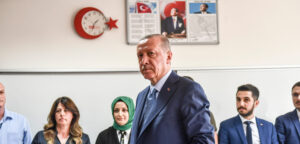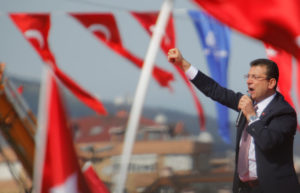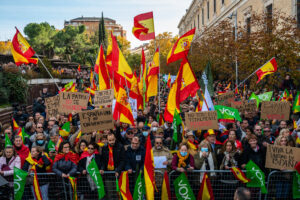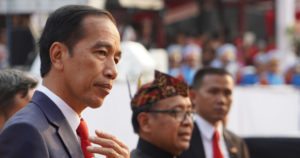July 2018, Volume 29, Issue 3
Election Watch
Reports on elections in Azerbaijan, Bhutan, Colombia, Hungary, Lebanon, Malaysia, Montenegro, Paraguay, Slovenia, Timor-Leste, Turkey, and Venezuela.
755 Results
July 2018, Volume 29, Issue 3
Reports on elections in Azerbaijan, Bhutan, Colombia, Hungary, Lebanon, Malaysia, Montenegro, Paraguay, Slovenia, Timor-Leste, Turkey, and Venezuela.
October 2018, Volume 29, Issue 4
Reports on elections in Cambodia, Maldives, Mali, Mauritania, Mexico, Pakistan, Rwanda, Swaziland, Turkey, and Zimbabwe.
January 2019, Volume 30, Issue 1
Reports on elections in Afghanistan, Armenia, Bahrain, Bhutan, Bosnia-Herzegovina, Brazil, Cameroon, Democratic Republic of Congo, Fiji, Gabon, Georgia, Latvia, Madagascar, Maldives, São Tomé and Príncipe, Swaziland, and Togo.
April 2019, Volume 30, Issue 2
Reports on elections in Bangladesh, Comoros, Democratic Republic of Congo, El Salvador, Estonia, Guinea-Bissau, Madagascar, Moldova, Nigeria, Senegal, and Togo.
April 2003, Volume 14, Issue 2
Excerpts from: Václav Havel’s last two addresses as president of the Czech Republic; Nicaraguan president Enrique Bolaños’s speech accepting the National Endowment for Democracy’s Democracy Service Medal; speech by Turkish Justice and Development Party chairman (now prime minister) Recep Tayyip Erdoğan; inaugural address of Brazilian president Luiz Inácio Lula da Silva.
Spring 1990, Volume 1, Issue 2
Excerpts from: the victory speech of Nicaraguan presidential candidate Violeta Barrios de Chamorro; South African president F.W. de Klerk’s speech opening Parliament; the platform of Lithuania’s pro-independence Sajudis movement.
July 1996, Volume 7, Issue 3
Reports on elections in Albania, Bangladesh, Benin, Chad, Cyprus, Czech Republic, Dominican Republic, Ecuador, India, Sierra Leone, South Korea, Suriname, Taiwan, Uganda, Western Samoa, Zimbabwe.


October 2021, Volume 32, Issue 4
Turkey’s ruling party has developed a new tool: When its local candidates lose, it dismisses them and appoints its own choice under a guise that maintains the veneer of democracy. It is an autocratic innovation that may soon spread.
October 2016, Volume 27, Issue 4
A review of The Quest for Good Governance: How Societies Develop Control of Corruption by Alina Mungiu-Pippidi.
April 2015, Volume 26, Issue 2
A review of Power Politics in Zimbabwe by Michael Bratton.
April 2017, Volume 28, Issue 2
Excerpts from: U.S. president Donald J. Trump’s inaugural address; remarks by U.S. vice-president Mike Pence and U.S. senator John McCain at the Munich Security Conference; speeches by Colombian president Juan Manuel Santos, Romanian president Klaus Iohannis, and the Gambia’s new president Adama Barrow; and NED president Carl Gershman’s remarks before the Lithuanian parliament.
January 2016, Volume 27, Issue 1
A review of Democratic Transitions: Conversations with World Leaders, edited by Sergio Bitar and Abraham F. Lowenthal.


April 2020, Volume 31, Issue 2
Is there a recipe for defeating a populist? A novel campaign strategy based on inclusion and public responsiveness may show how to beat the odds in a competitive authoritarian system.
January 2021, Volume 32, Issue 1
A review of The Tyranny of Merit: What’s Become of the Common Good? by Michael J. Sandel.
April 2022, Volume 33, Issue 2
Europe appeared ready to turn its back on the pessimistic vision of populists—and then Putin upended the continent. A new book may serve as a textbook for progress, or a signpost of democracy’s dashed hopes.
October 2017, Volume 28, Issue 4
A review of China’s Eurasian Century? Political and Strategic Implications of the Belt and Road Initiative by Nadège Rolland.
July 2014, Volume 25, Issue 3
A review of Temptations of Power: Islamists and Illiberal Democracy in a New Middle East by Shadi Hamid.


January 2023, Volume 34, Issue 1
When ordinary voters are given a choice between democracy and partisan loyalty, who will put democracy first? Frighteningly, Europe harbors a deep reservoir of authoritarian potential.

January 2018, Volume 29, Issue 1
To safeguard their ill-gotten gains, kleptocrats rely on a web of transnational relationships and the complicity of Western fixers.


October 2019, Volume 30, Issue 4
For the second straight time, voters rejected a presidential candidate with ties to undemocratic Islamist forces, but victorious incumbent Joko Widodo felt compelled to tone down his support for liberalism.